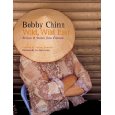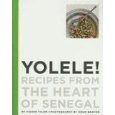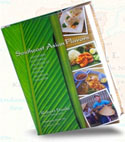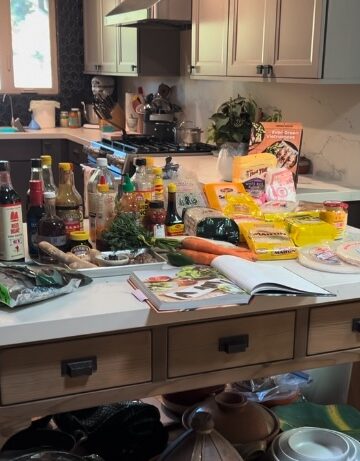At the end of every year I go on a small cookbook buying spree. It’s not for tax reasons but rather small gifts to myself. Who else knows what I want better than I do? I’ve been buying cookbooks for about twenty years and my library currently contains about 400 volumes. Last week, I grew the Vietnamese portion of collection to eighty with two chef memoir-cum-recipe books. To indirectly boost the Viet works, I also acquired a work on African cooking. Now, I'm eyeing a new work on Southeast Asian cuisines. If you're interested in Vietnamese and/or Southeast Asian food, take a serious look at these four titles.

The Vietnamese cookbooks were written by overseas chefs Pauline and Luke Nguyen and Bobby Chinn. The Nguyens (no relation to me, please!) have a chic restaurant in Australia called Red Lantern. I picked up a copy of their hefty book in Shanghai last April. A beautifully designed publication, Secrets of the Red Lantern: Stories and Recipes from the Heart has since been released in the U.S. While the book's organization and recipes could have been presented and written better for home cooks (see our discussion on their bo kho beef stew that uses Coca Cola and Laughing Cow cheese), I found that the work offered interesting insights into the experience of Vietnamese immigrants to Australia. I’ve yet to visit the country but it has some of the finest ingredients for preparing Southeast Asian fare. It’s an interesting book for comparing and contrasting Vietnamese restaurant fare inside and outside of the motherland.

Bobby Chinn, the chef/owner of an eponymous restaurant in Hanoi, TV-show host of Asia Cafe and former comedian authored an interesting, if not somewhat crazy, cookbook called Wild, Wild East: Recipes and Stories from Vietnam (The title plays on the late 1960s TV series called Wild, Wild West starring Robert Conrad. Note the similar subtitles between Nguyen and Chinn’s books.) At the outset, you’ll encounter Chinn’s brash attitude, but dig a little deeper and you’ll discover that he respects the people and cuisine of Vietnam very much. There are riffs and fusion recipes based on Chinn’s high-end restaurant menu but what I found fascinating were recipes and discussion for everyday ingredients such as caramel sauce (nuoc mau), which employs 1 cup of palm sugar and ¾ cup of water, all cooked together to a nearly burnt state. I use regular granulated sugar for my caramel sauce and Chinn's approach got me thinking about trying it out with palm sugar. The photos of people and food scenes from Vietnam are valuable in that they’re real and documentary.

Another work that I added to my library is not purely Vietnamese, but rather contains Viet recipes. After realizing that there are Vietnamese people living in Senegal, I got a copy of Yolele! Recipes from the Heart of Senegal by Pierre Thiam. Turns out that Thiam has a Vietnamese uncle and the book includes a few Vietnamese recipes, including ones for banh tom shrimp and sweet potato fritters and of course, nuoc cham dipping sauce. I wish there was more text to introduce all the recipes as that would to better understand the role of Vietnamese food in Senegalese cuisine.

The last Asian cookbook that’s worth investigating was authored by chef/instructor Robert Danhi, an Asian food expert who’s taught at the Culinary Institute of America for years. Southeast Asian Flavors is densely packed with photos and cultural information, including some terrific recipes collected from his travels to Vietnam. I’ve tasted Danhi's Vietnamese preparation of a simple roasted pork belly with chile salt and it’s great; you can sample the publication by checking out the cookbook's website (select downloadable recipes and video are included). The book has a recipe for Sriracha chile sauce but don’t expect the Vietnamese American stuff. The recipe reflects what is actually made in Sri Racha, a seaside city in Thailand. I’ve yet to get a copy of this book but look forward to owning it as a way to further make the connections between the foods of Southeast Asia.
Have any thoughts on these works? And, what new Asian cookbooks are you reading and cooking from?

















White On Rice Couple says
Ooohhh, more books to add to my collection! I have Pauline's book (great memoir with stories that I can relate to) and will be getting the others soon.
I was so intrigued by your Viet in Senegal post. I asked everyone at Mom's work if they know of any Viet's living there. And lo and behold, someone has an Cousin who was born there and now lives in Canada, but his family still lives there. Wow, that's so cool and fascinating. I love it! She's getting me more info about their family presence there
Diana Nguyen says
I found that The Secrets of the Red Lantern the most authentic vietnamese cookbook that I have found to date (sorry Andrea, I do have your book as well). The recipes are simple and easy to execute which is the way that vietnamese recipes should be and best of all, they taste AUTHENTIC! Some recipes actually tasted even better than my mom's. It is now my go to book for all vietnamese cooking. I have tried the recipe for the bo kho and it is fantastic. I guess the discussion regarding the hop
Diana Nguyen says
Andrea, you may want to make a correction in your blog. The other writer of the red lantern book is not Bobby Chinn, but Mark Jensen.
Andrea Nguyen says
Diana, thanks for your feedback. Good to know that the bo kho recipe tastes good. Authenticity is a fleeting issue in food, particularly Vietnamese food which evolves so quickly. What's important is that you understand how the flavors come together and the techniques that are involved, so that you can make food that you enjoy. Sounds like you've found a work that works with your palate and cooking style.
As for the listing of authors, the sentence you refer to is about both Vietnamese cookbooks,
Andrea Nguyen says
WORC - so good to know more about the Senegal-Viet connection. And for your personal take on caramel sauce with palm sugar!
You can never have enough cookbooks. I learn something new from every work I have.
cj says
we received The Secrets of the Red Lantern cookbook for Christmas and I have been wondering about the, "hot bap" myself. What is it or is there a suitable substute? I see in one of your comments Andrea that Pauline offered some clarification in this regard, I'd like to know what she said.
Thanks
Sarah says
There's another book that I'm dying to buy, but it's only available in Australia. It's called "Koto: a culinary journey through Vietnam" by Tracey Lister. The profits from the sell of this book will be used to further finance a restaurant in Vietnam that trains homeless Vietnamese kids to work in the restaurant business. The recipes are from each region in Vietnam and the recipes are provided by expert home cooks, street vendors, or expert chefs of each region. Can't wait until it comes out in t
Andrea Nguyen says
CJ -- for the hop bap, see this posting for clarification:
http://www.vietworldkitchen.com/blog/2008/11/what-is-hop-bap.html
Sarah -- Thanks for the heads up. I'm going to keep my eyes out for Koto. What an interesting name for the book!
Joel says
I just got both Secrets of the Red Lantern and Koto from the local Borders in New Zealand. It seems that no one else is selling the Koto book anywhere else, and you may find you need to order directly from the publisher.
My first impression of the book is it is Tracey Lister and Andreas Pohl's collection of Vietnamese recipes from friends and acquaintances they have made in Vietnam, and from some of their students who graduated from Koto and now serving as chefs at various Vietnamese restaurant
Andrea Nguyen says
Joel, it's always such a pleasure to have your book review! The Koto work is hard to find. Sounds like the omission of sweets was kinda wimpy. Oh well...
taobao agent says
i love you post
cheap jordans says
In the panic after the crash in oil prices in 2008, companies quickly scrapped oil projects around the world.
marlon says
The book divides dishes into geographic regions, and there is no recipe for sweet snacks/desserts because "while the Vietnamese have a fondness for sweet snacks between meals.